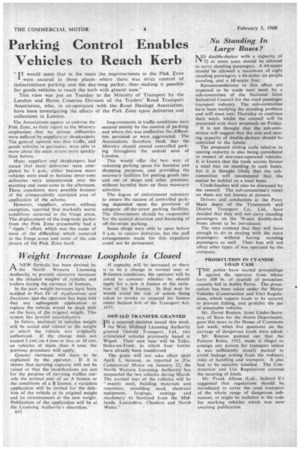No Standing In Large Buses?
Page 40

If you've noticed an error in this article please click here to report it so we can fix it.
NM double-decker with a capacity of I N 72 or more seats should be allowed to carry standing passengers. A 64-seater should be allowed a maximum of eight standing passengers, a 66-seater six people standing, and a 68-seater four. Recommendations to this effect are expected to be made next week by a sub-committee of the National Joint Industrial Council for the road passenger transport industry. The sub-committee have been studying the standing problem and will meet next Thursday to continue their work, whilst the council will be presented with their proposals on Friday. It is not thought that the sub-committee will suggest that the size and seating Capacity of double-deckers should be restricted in the future. The proposed sliding scale relative to seating capacity is also being considered in respect of one-man-operated vehicles. It isknown that the trade unions favour a total ban on standing in such buses, but it is thought likely that the subcommittee will recommend that the matter be tackled on a focal basis. Crush-loaders Will also be discussed by the council. The sub-committee's views on them are not known at present, Drivers and "conductors at the Percy Main depot of the Tynernouth and District Transport Co., Ltd., have decided that they will not carry standing passengers on the 78-seat double-deck buses about to be introduced. The men contend that they will have enough to do in dealing with the extra passengers without having standing passengers as well. Their ban will not affect other types of bus operated by the company,
PROSECUTION IN CYANIDE LOAD CASE
THE police have started proceedings against the operator from whose lorry 300 lb. of cyanide of potassium recently fell in Ashby Parva. The prosecution has been taken under the Motor Vehicles (Construction and Use) Regulations, which require loads to be secured to prevent falling, and prohibit the use of unsuitable vehicles. . Mr. David Renton, Joint Under-Secretary of State. for the Home Department, gave this news to the House of Commons last week, when five questions on the carriage of dangerous loads were asked. Mr. Renton pointed out that the Poisons Rules, 1952, made it illegal to consign any poison for transport unless it was sufficiently stoutly packed to avoid leakage arising from the ordinary risks of handling and transport. It also had to be suitably labelled. The Construction and Use Regulations covered the securing of loads. Mr. Frank Allaun (Lab., Salford E.) suggested that regulations should be introduced to cover the road transport of the whole range of dangerous substances, or might be included in the code for marking vehicles which was now awaiting publication.




























































































































